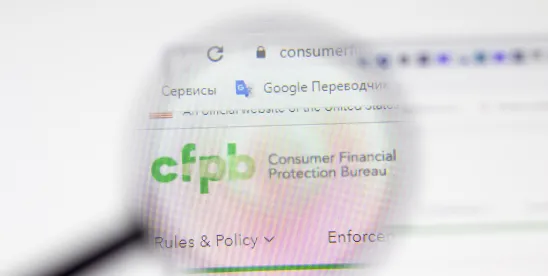In a 7-2 decision that was widely expected after oral argument, the US Supreme Court issued its decision in Consumer Financial Protection Bureau v. Community Financial Services Association of America, Ltd. on May 16, holding that the Consumer Financial Protection Bureau's funding mechanism, as set forth in Title X of the Dodd–Frank Wall Street Reform Consumer Protection Act,1 is constitutional.2
Authored by Justice Clarence Thomas, the decision finds that the Dodd–Frank Act's funding scheme for the CFPA complies with the US Constitution's Appropriations Clause, which states that "[n]o Money shall be drawn from the Treasury, but in Consequence of Appropriations made by Law."3 In evaluating the CFPB's funding structure against the Constitution's requirements, the Court found that the agency's appropriation mechanism is constitutionally permissible given that it includes an identifiable source of public money and a designated purpose. To that end, the opinion holds that "[b]ased on the Constitution's text, the history against which that text was enacted, and congressional practice immediately following ratification, . . . appropriations need only identify a source of public funds and authorize the expenditure of those funds for designated purposes to satisfy the Appropriations Clause."
Background
The case arises from a challenge by the Community Financial Services Association of America (CFSA), a nonbank consumer lender trade association, related to certain provisions in final rules adopted by the CFPB related to consumer payment authorizations on higher interest, short-term consumer lending products.4 In its challenge to the CFPB's adoption of the Payday Rule, the CFSA raised a number of arguments, including one that challenged the CFPB's funding mechanism as violative of the Appropriations Cause. Specifically, the CFSA posited that the CFPB's funding mechanism "usurp[ed] Congress's role in the appropriation of federal funds," arguing further that such funding was too open-ended and inconsistent with other federal agencies that require annual funding authorization from Congress. The US District Court in the Western District of Texas initially held that the CFPB's funding mechanism did not create an "Appropriation Clause issue."5 The US Court of Appeals for the Fifth Circuit agreed with CFSA, however, finding the CFPB's funding mechanism violated the Appropriations Clause.6
The CFPB appealed and oral argument was held on October 3, 2023.
What This Means
- Cases that were stayed pending the Supreme Court's decision in this case will now become actively litigated. This includes the payment authorization provisions at the heart of the CFSA case as well as other cases that have been stayed or had injunctions issued based upon the Fifth Circuit decision. For example, the preliminary injunction that was recently entered in the lawsuit challenging the CFPB's final rule limiting credit card late fees for certain large issuers to $8 could be dissolved, thereby paving the way for the rule to go into effect. The same is true for the numerous federal cases challenging the CFPB's final rules implementing Section 1071 of the Dodd–Frank Act (requiring small business lenders to gather numerous data points in connection with applications for credit provided by small businesses).7
- Although it appears that many avenues to challenge the Dodd–Frank Act's statutory provisions as they relate to the creation and administration of the CFPB have now been assessed by the Supreme Court and found to be constitutional,8 there are still other avenues available to individuals or entities that have bases for challenging the CFPB's actions. For example, as is true in the underlying CFSA case, the facts at issue may support challenges raised in connection with a potential violation of the federal Administrative Procedures Act (whereby federal agency actions can be set aside if they are found to be arbitrary, capricious, an abuse of discretion, or "otherwise not in accordance with law").
- Other agencies that obtain funds in a manner that is not tied to Congressional appropriations can breathe a momentary, collective "sigh of relief." Some (likely rightly) believed that the funding mechanism of the Office of the Comptroller of the Currency (the primary federal regulator of national banks) and the Federal Deposit Insurance Corporation, as well as other federal agencies like the US Postal System, could find their funding methods challenged if the CFSA's argument had resonated with the Supreme Court.
- With this decision, the CFPB will now reignite its enforcement actions, which had likely been limited given this open Constitutional question. As disclosed in 2023, the CFPB has already begun a "hiring spree" to fill 75 new full-time positions in the agency's Enforcement Division.9 All individuals and persons who fit within the definition of "covered person" (as set forth in Title X of the Dodd–Frank Act) should prepare accordingly.








 />i
/>i

